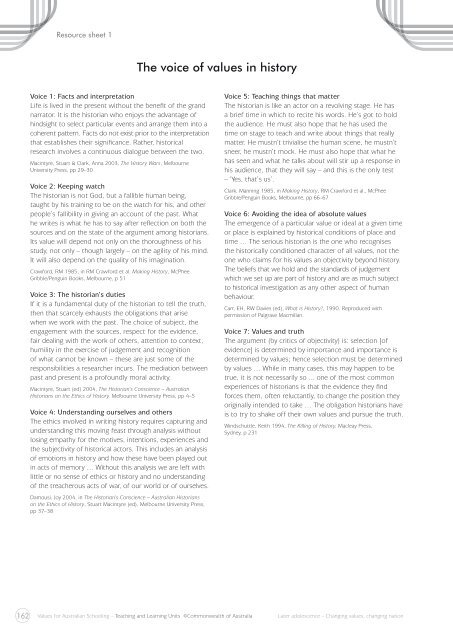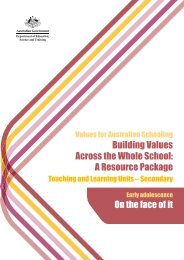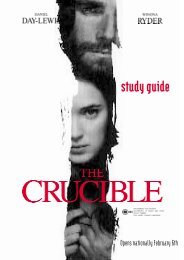Changing values, changing nation - Saint Ignatius' Moodle Community
Changing values, changing nation - Saint Ignatius' Moodle Community
Changing values, changing nation - Saint Ignatius' Moodle Community
You also want an ePaper? Increase the reach of your titles
YUMPU automatically turns print PDFs into web optimized ePapers that Google loves.
Resource sheet 1<br />
The voice of <strong>values</strong> in history<br />
Voice 1: Facts and interpretation<br />
Life is lived in the present without the benefit of the grand<br />
narrator. It is the historian who enjoys the advantage of<br />
hindsight to select particular events and arrange them into a<br />
coherent pattern. Facts do not exist prior to the interpretation<br />
that establishes their significance. Rather, historical<br />
research involves a continuous dialogue between the two.<br />
Macintyre, Stuart & Clark, Anna 2003, The History Wars, Melbourne<br />
University Press, pp 29–30<br />
Voice 2: Keeping watch<br />
The historian is not God, but a fallible human being,<br />
taught by his training to be on the watch for his, and other<br />
people’s fallibility in giving an account of the past. What<br />
he writes is what he has to say after reflection on both the<br />
sources and on the state of the argument among historians.<br />
Its value will depend not only on the thoroughness of his<br />
study, not only – though largely – on the agility of his mind.<br />
It will also depend on the quality of his imagi<strong>nation</strong>.<br />
Crawford, RM 1985, in RM Crawford et al. Making History, McPhee<br />
Gribble/Penguin Books, Melbourne, p 51<br />
Voice 3: The historian’s duties<br />
If it is a fundamental duty of the historian to tell the truth,<br />
then that scarcely exhausts the obligations that arise<br />
when we work with the past. The choice of subject, the<br />
engagement with the sources, respect for the evidence,<br />
fair dealing with the work of others, attention to context,<br />
humility in the exercise of judgement and recognition<br />
of what cannot be known – these are just some of the<br />
responsibilities a researcher incurs. The mediation between<br />
past and present is a profoundly moral activity.<br />
Macintyre, Stuart (ed) 2004, The Historian’s Conscience – Australian<br />
Historians on the Ethics of History, Melbourne University Press, pp 4–5<br />
Voice 4: Understanding ourselves and others<br />
The ethics involved in writing history requires capturing and<br />
understanding this moving feast through analysis without<br />
losing empathy for the motives, intentions, experiences and<br />
the subjectivity of historical actors. This includes an analysis<br />
of emotions in history and how these have been played out<br />
in acts of memory … Without this analysis we are left with<br />
little or no sense of ethics or history and no understanding<br />
of the treacherous acts of war, of our world or of ourselves.<br />
Damousi, Joy 2004, in The Historian’s Conscience – Australian Historians<br />
on the Ethics of History, Stuart Macintyre (ed), Melbourne University Press,<br />
pp 37–38<br />
Voice 5: Teaching things that matter<br />
The historian is like an actor on a revolving stage. He has<br />
a brief time in which to recite his words. He’s got to hold<br />
the audience. He must also hope that he has used the<br />
time on stage to teach and write about things that really<br />
matter. He mustn’t trivialise the human scene, he mustn’t<br />
sneer, he mustn’t mock. He must also hope that what he<br />
has seen and what he talks about will stir up a response in<br />
his audience, that they will say – and this is the only test<br />
– ‘Yes, that’s us’.<br />
Clark, Manning 1985, in Making History, RM Crawford et al., McPhee<br />
Gribble/Penguin Books, Melbourne, pp 66–67<br />
Voice 6: Avoiding the idea of absolute <strong>values</strong><br />
The emergence of a particular value or ideal at a given time<br />
or place is explained by historical conditions of place and<br />
time … The serious historian is the one who recognises<br />
the historically conditioned character of all <strong>values</strong>, not the<br />
one who claims for his <strong>values</strong> an objectivity beyond history.<br />
The beliefs that we hold and the standards of judgement<br />
which we set up are part of history and are as much subject<br />
to historical investigation as any other aspect of human<br />
behaviour.<br />
Carr, EH, RW Davies (ed), What is History?, 1990. Reproduced with<br />
permission of Palgrave Macmillan.<br />
Voice 7: Values and truth<br />
The argument (by critics of objectivity) is: selection [of<br />
evidence] is determined by importance and importance is<br />
determined by <strong>values</strong>; hence selection must be determined<br />
by <strong>values</strong> … While in many cases, this may happen to be<br />
true, it is not necessarily so ... one of the most common<br />
experiences of historians is that the evidence they find<br />
forces them, often reluctantly, to change the position they<br />
originally intended to take … The obligation historians have<br />
is to try to shake off their own <strong>values</strong> and pursue the truth.<br />
Windschuttle, Keith 1994, The Killing of History, Macleay Press,<br />
Sydney, p 231<br />
162<br />
Values for Australian Schooling – Teaching and Learning Units ©Commonwealth of Australia<br />
Later adolescence – <strong>Changing</strong> <strong>values</strong>, <strong>changing</strong> <strong>nation</strong>







